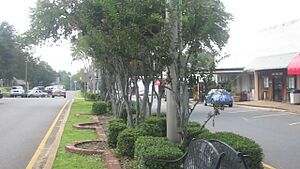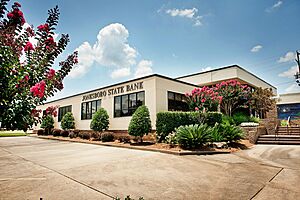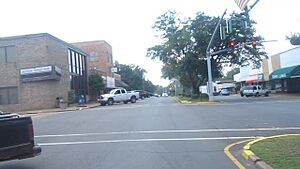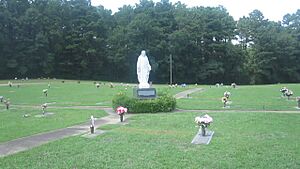Jonesboro, Louisiana facts for kids
Quick facts for kids
Jonesboro, Louisiana
|
|
|---|---|
| Town of Jonesboro | |
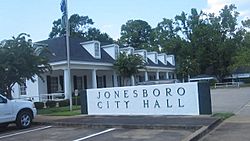
Jonesboro City Hall
|
|
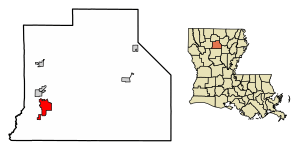
Location of Jonesboro in Jackson Parish, Louisiana
|
|
| Country | |
| State | |
| Parish | Jackson |
| Area | |
| • Total | 4.90 sq mi (12.70 km2) |
| • Land | 4.85 sq mi (12.55 km2) |
| • Water | 0.06 sq mi (0.15 km2) |
| Population
(2020)
|
|
| • Total | 4,106 |
| • Density | 847.12/sq mi (327.09/km2) |
| Time zone | UTC-6 (CST) |
| • Summer (DST) | UTC-5 (CDT) |
| ZIP Code |
71251
|
| Area code | 318 |
| FIPS code | 22-38670 |
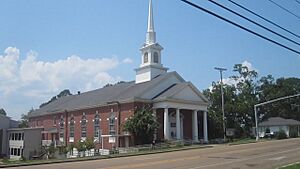
Jonesboro (/ˈdʒoʊnzbʌrə/) is a town in northern Louisiana, in the United States. It is the main town and the "parish seat" of Jackson Parish. A parish seat is like a county seat, where the local government offices are located. In 2020, about 4,106 people lived in Jonesboro.
Contents
History of Jonesboro
Jonesboro was started on January 10, 1860, by Joseph Jones and his wife, Sarah Pankey Jones. It began as a small family farm. The town was first called "Macedonia."
From Farm to Town
On January 16, 1901, the town's name changed to Jonesboro. This happened after the United States Post Office Department approved the new name. Jonesboro became the center of government for Jackson Parish on March 15, 1911. This decision was made after people in the parish voted. Today, Jonesboro is still important for farming, industry, and government in the parish.
Civil Rights Efforts
During the 1960s, a time called the Civil Rights Movement, African Americans worked to gain their equal rights. In Jonesboro, these efforts faced strong opposition. Some groups caused problems for activists. For example, crosses were burned on the lawns of African-American voters. Also, some black churches and community buildings were damaged by fire.
In November 1964, two men named Earnest "Chilly Willy" Thomas and Frederick Douglass Kirkpatrick started a group called the Deacons for Defense and Justice in Jonesboro. Many members of this group were veterans from World War II and the Korean War. They worked to protect civil rights activists and their families. They would patrol the black community, known as "the Quarters," especially during demonstrations.
The Deacons for Defense and Justice helped make changes in Jonesboro. For example, parks and a swimming pool became open to everyone. More progress was made after the Voting Rights Act of 1965 was passed. This law helped African Americans take part in politics.
Geography of Jonesboro
Jonesboro is located in the southwestern part of Jackson Parish.
Roads and Waterways
U.S. Route 167 goes through the northern and eastern sides of the town. This road leads north about 22 miles (35 km) to Ruston. It also goes south about 23 miles (37 km) to Winnfield. Louisiana Highway 4 goes through the middle of Jonesboro. It leads east about 17 miles (27 km) to Chatham. It also goes west about 19 miles (31 km) to Lucky.
The United States Census Bureau says that Jonesboro covers about 4.9 square miles (12.7 square kilometers). Most of this area is land. Only a small part, about 0.06 square miles (0.15 square kilometers), is water. The water in Jonesboro flows north into the Little Dugdemona River. This river then turns southwest and becomes the Dugdemona River.
Climate in Jonesboro
Jonesboro has a climate with hot, humid summers. The winters are usually mild to cool. This type of weather is called a humid subtropical climate. On climate maps, it is shown as "Cfa."
Population of Jonesboro
| Historical population | |||
|---|---|---|---|
| Census | Pop. | %± | |
| 1910 | 1,134 | — | |
| 1920 | 837 | −26.2% | |
| 1930 | 1,949 | 132.9% | |
| 1940 | 2,639 | 35.4% | |
| 1950 | 3,097 | 17.4% | |
| 1960 | 3,848 | 24.2% | |
| 1970 | 5,072 | 31.8% | |
| 1980 | 5,061 | −0.2% | |
| 1990 | 4,305 | −14.9% | |
| 2000 | 3,914 | −9.1% | |
| 2010 | 4,704 | 20.2% | |
| 2020 | 4,106 | −12.7% | |
| U.S. Decennial Census | |||
| Race | Number | Percentage |
|---|---|---|
| White (not Hispanic) | 1,531 | 37.29% |
| Black or African American (not Hispanic) | 2,066 | 50.32% |
| Native American | 3 | 0.07% |
| Asian | 102 | 2.48% |
| Pacific Islander | 2 | 0.05% |
| Other/Mixed | 135 | 3.29% |
| Hispanic or Latino | 268 | 6.5% |
As of the 2020 United States census, there were 4,106 people living in Jonesboro. There were 1,374 households and 754 families.
Arts and Culture in Jonesboro
Jonesboro hosts two fun festivals each year.
Christmas Wonderland
"Christmas Wonderland in the Pines" is a local festival. It happens every year. The festival starts the Saturday after Thanksgiving Day. It continues through the month of December.
Sunshine Festival
Jonesboro also has a "Sunshine Festival" in the summer. This festival features antique cars and tractors. There is also food and games for everyone to enjoy.
Infrastructure in Jonesboro
Transportation
U.S. Highway 167 passes near Jonesboro. This highway is about 24 miles (39 km) south of Ruston. Louisiana Highway 4 also meets Highway 167 in Jonesboro. Jonesboro is in the southwestern part of Jackson Parish.
Education in Jonesboro
The Jackson Parish School Board manages the public schools in Jonesboro.
Local Schools
The schools that serve Jonesboro include:
- Jonesboro-Hodge Elementary School
- Jonesboro-Hodge Middle School
- Jonesboro-Hodge High School
College Campus
The town is also home to a campus of Louisiana Delta Community College. This college offers classes in welding and business. It also has many general courses.
Notable People from Jonesboro
Many interesting people have come from Jonesboro.
- Rodney Alexander was a U.S. Representative. He also served as secretary of the Louisiana Department of Veterans Affairs.
- Marty Booker is a former NFL wide receiver.
- James Houston "Jimmie" Davis was a governor of Louisiana. He was also an actor and wrote the famous song "You Are My Sunshine." He is buried in Jonesboro.
- John Garlington played as a linebacker in the National Football League for the Cleveland Browns.
- Frederick Douglass Kirkpatrick was a singer, minister, and civil rights activist. He helped start the Deacons for Defense and Justice in Jonesboro.
- Randy Moffett was born in Jonesboro in 1947. He was the president of the University of Louisiana System from 2008 to 2012.
- James P. Pope was a U.S. Senator from Idaho. He was also a former mayor of Boise.
- Jerry Robinson was an NFL kick returner. He played professional football for the San Diego Chargers and NY Jets.
- Addarren "Lil Snupe" Ross was a rapper from Jonesboro. He signed with Meek Mill's record label.
See also
 In Spanish: Jonesboro (Luisiana) para niños
In Spanish: Jonesboro (Luisiana) para niños
 | William Lucy |
 | Charles Hayes |
 | Cleveland Robinson |




